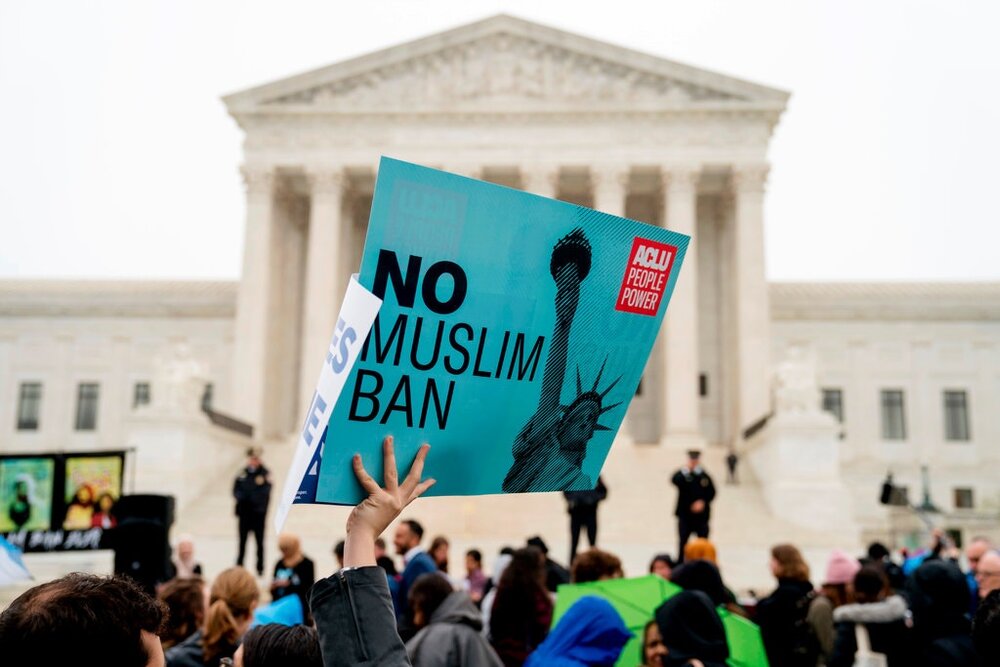Trump’s Muslim ban: For the sake of safer America or anti-Muslim bigots

House Democrats on Wednesday voted to pass a legislation that would revoke the U.S. President Donald Trump administration’s controversial order banning entry to immigrants from mostly Muslim-majority countries.
The ‘NO BAN Act’ received broad support in the Democratic-controlled House with 233 votes in favor and 183 against, however, it is unlikely to advance in the Republican Senate. At least, it can be regarded as a symbolic victory for civil rights groups.
Trump’s initial ban targeted Iran, Libya, Somalia, Syria, and Yemen, generating criticism that it amounted to unlawful religious discrimination. Trump then expanded the ban to include Venezuela and North Korea, and later added Nigeria, Myanmar, Sudan, and three other countries to the list.
The ban has affected millions of Muslim Americans. It has cut them off from their families, friends, and loved ones who are barred from entering the United States. It has also barred people fleeing violence, those hoping to access medical treatment, or pursue their careers.
Looking into Trump’s words in his speeches and tweets may clearly reveal his attitude towards Muslim people. Does he try to spread hatred by calling them deranged or hostile people?Let’s have a peek into the roots of the ban. Is Trump an Islamophobic bigot or he defends the ban as a necessity for national security and safer America?
Looking into Trump’s words in his speeches and tweets may clearly reveal his attitude towards Muslim people. Does he try to spread hatred by calling them deranged or hostile people?
For instance, in 2011 Trump publicly questioned President Barack Obama’s religious beliefs and place of birth. As he debated running for president in the 2012 election, Trump said in a radio interview: “He doesn’t have a birth certificate, or if he does, there’s something on that certificate that is very bad for him. Now, somebody told me — and I have no idea if this is bad for him or not, but perhaps it would be — that where it says ‘religion,’ it might have ‘Muslim.’ And if you’re a Muslim, you don’t change your religion, by the way.”
Later in March 2016, Trump said, “I think Islam hates us. There’s something there that — there’s a tremendous hatred there. There’s a tremendous hatred. We have to get to the bottom of it. There’s an unbelievable hatred of us.” In the same time, soon after three suicide bombings in Brussels tied to a group of French and Belgian Muslims, Trump told Fox Business: “We’re having problems with the Muslims, and we’re having problems with Muslims coming into the country.”
Form Trump’s deeds and words, one can perceive that he has just tried to expand kind of a racist policy over the past couple of years through ongoing attacks on Muslims and many communities of color.
Based on the Global Terrorism Database compiled at the National Consortium for the Study of Terrorism and Responses to Terrorism at the University of Maryland, no American has ever been killed in a terrorist attack in the United States that has been carried out by a national of the now-banned countries, according to a 2017 report by the Center for American Progress.
In the current political scene, the Muslim travel ban acts as a trump card for former Vice President Joe Biden, who has pledged that if he is elected president, he will end the ban on his first day in office.
“Muslim communities are the first to feel Donald Trump’s assault on Black and brown communities in this country, with his vile Muslim ban. That fight was the opening barrage in what has been nearly four years of constant pressure and insults… If I have the honor of being president, I will end the Muslim ban on day one,” Biden said on Monday.
Meanwhile, in a recent speech at the White House, Trump accused Biden of wanting to “end all travel bans, including from jihadist regions”, and he implied Biden would allow “people that are going to come in and blow up our cities, do things”.
Does Trump’s decision undermine the so-called “religious freedom” in the United States? Opponents believe it discriminates based on religion, saying the U.S. immigration policy should never be based on anti-religious sentiment. They also suppose the revoke of the ban as an objective test of the nation’s commitment to religious freedom, believing that targeting people based on their faith is an affront to “American ideals of religious freedom for all”.
AFM/PA
Leave a Comment